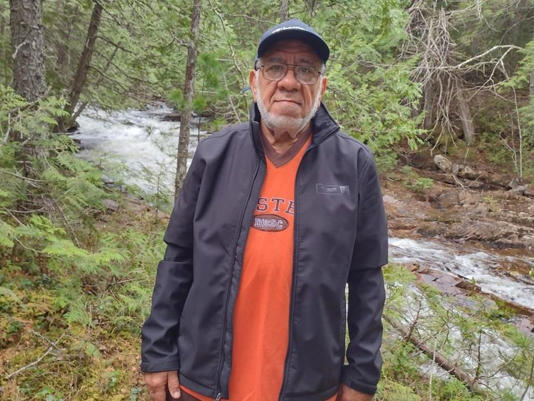OTTAWA — Dr. Ezzat Gouda recalls his wife’s disbelief when he told her his refugee claim in Canada had been denied, and he would be sent back to his home country — where he faces a death sentence.
“She said, ‘How is this possible, in a country like Canada?'” he said in Arabic through an interpreter on Monday.
Gouda was speaking two days before he is scheduled to fly home to Egypt, where the legal system has sentenced him to capital punishment.
The couple, who have had to live apart since 2014, always dreamt that one day she could join him in Canada, he said. Now they fear they will have to endure terror together in Egypt.
Gouda, a retired obstetrician,has been ordered to return to Egypt by Nov. 1, despite claims that he will be persecuted and killed in that country because of his political affiliations in the aftermath of the Arab Spring revolution.
“I was shocked because I had submitted official documents, authentic documents of my life sentence and my death sentence,” he said. He was found guilty in absentia in connection with two demonstrations that turned violent in 2013.
He showed Canadian officials court documents that prove he has been sentenced to death in Egypt, but the senior immigration officer felt they were too vague and insufficient for his refugee claim to be accepted, a written decision shows.
“I note that both of these court orders are dated approximately eight years ago and the details of the charges and grounds for the arrest were not provided,” the official said in the decision.
Gouda had already been arrested without charges several times by 2011, when millions of Egyptians staged an uprising known to protest against the country’s president at the time, Hosni Mubarak, and demand democracy. It was one of a number of anti-government rebellions in the Middle East around that time, in a movement known as the Arab Spring.
Gouda said he helped establish the Freedom and Justice Party, which was affiliated with the Muslim Brotherhood group and came to power following the country’s 2012 elections.
In 2013, Egypt’s army chief seized power in a military coup against the elected party’s government. Since then, Egyptian authorities have arrested thousands of the party’s members and Muslim Brotherhood supporters after labelling them as terrorists in a campaign that Amnesty International called a “ruthless bid to crush dissent.”
The days after the coup were full of fear and grief for Gouda and his family. He said his 26-year-old son, Abdul Rahman, was shot and killed while participating in a march against the military takeover.
Days later, dozens of men with weapons broke into his father’s house, where he was staying with several family members, at 4 a.m. They also destroyed his clinic, he said. He hasn’t returned to the home or clinic since.
The following month, on Aug. 16, 2013, he said his second son, Omar, was fatally shot while participating in what Gouda describes as a peaceful protest. Gouda was working in the hospital when his wife called to tell him that their son was killed. Omar’s body was brought to the mortuary in the hospital the next day.
Gouda said police and army officers continued to harass his family, and even stormed his home while he was away, until he fled to Djibouti in 2014.
He hoped his wife and two remaining children would be able to join him, he said. But her passport was confiscated and the family’s assets were seized.
He continued to work as a physician in Djibouti until he reached retirement age last year, but once he wasn’t allowed to work he had to leave the country, he said.
He was denied a visa to Canada and instead entered the country at the unofficial Roxham Road crossing between Canada and the United States in March 2022.
He told immigration officials he feared living in the United States because of increased hatred and racism toward Muslims.
Gouda’s account matches the evidence he provided to immigration officials in his bid to remain in Canada.
The decision to deny his refugee status was handed down in December.
“Knowing Canada is the country of … respect (for) human rights and freedoms, and this is why I came here, I was shocked that this was the decision that came through,” he said.
Over the last year, Gouda said his family continued to be harassed by the Egyptian state and questioned about his location.
Earlier this year, he said his son-in-law was detained, tortured and questioned for five months.
“The Egyptian government has been looking for me and if the Canadian government sends me to Egypt, the Canadian government is writing my death sentence,” he said.
Gouda has a flight booked back to Egypt on Nov. 1.
Last year, dozens of Muslim Canadian organizations implored the prime minister to intervene on behalf of similar refugee claimants in Vancouver.
The Canadian Muslim Public Affairs Council warned that five families could be kicked out of Canada because of their ties to the same political entities.
In the one of those cases, Abdelrahman Elmady’s refugee claim was denied in Vancouver after the CBSA characterized him as a “security threat” because of ties to the Freedom and Justice Party in his home country.
The council said at the time that he was deemed a security risk because of the party’s connection to the Muslim Brotherhood. Neither group is listed as a terrorist entity in Canada.
Elmady has since applied for ministerial relief.
As for Gouda, he said he is hoping Canada will reconsider its deportation order and re-evaluate the risk he faces in Egypt.
He fears his return is unlikely to be a happy reunion for his family.
“My wife and daughters live in constant fear and this has just made it worse,” he said. “They have anxiety and fear for my life if I’m returned.”
Source: Laura Osman, The Canadian Press

